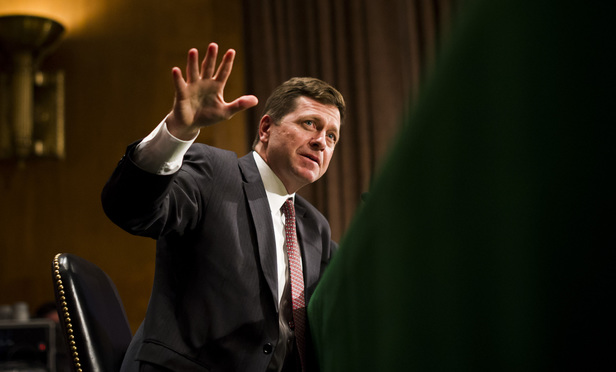Related: Dodd-Frank ‘Should Be Looked At,’ Clayton Tells Senate
Sen. Sherrod Brown, the top Democrat on the Senate Banking Committee, told Clayton that Trump selected Goldman Sachs’ “outside counsel” to run the SEC.
“You spent your career protecting some of the biggest names on Wall Street, and those relationships pose a host of conflicts for this position. I’m concerned you may need to recuse yourself too often at a time when we need a strong, independent SEC chair at the frontline of enforcement, not watching from the sidelines,” Brown, D-Ohio, said. “Your record representing banks and bankers and hedge funds and executives speaks for itself, but those people are already well-represented among the president’s friends, supporters, advisers and far too many people in all three branches of government.”
The committee’s chairman, Sen. Mike Crapo, R-Idaho, sought to help Clayton head off those questions from the outset of the hearing, asking him to weigh in on the conflict-of-interest concerns. Clayton described the breadth of his private experience—helping national and international clients with securities offerings, regulatory matters ad mergers and acquisitions—as a “strength.”
“As far as the extent of my practice, and whether the recusals that would be required and the potential conflicts will impair my ability to act as chair of the Securities and Exchange Commission, I do not believe they will do so,” Clayton said.
Clayton said he had discussed conflict-of-interest issues “at length” with the SEC ethics office and the Office of Government Ethics, which has been outspoken with concerns about the Trump administration’s various business ties.
“This is not a new issue. There is a protocol in place for dealing with those matters,” Clayton said. “Most importantly, I believe that if I am recused, that my fellow commissioners will be able to handle the matters ably and to good effect.”
Indeed, during her time as SEC chairwoman, White was dogged with similar questions over conflicts of interest arising out of her time at Debevoise & Plimpton, the firm where she has since returned. Her recusals created 2-2 splits among the remaining commissioners that Sen. Elizabeth Warren, D-Massachusetts, cited Thursday as allowing some targets of the SEC “to get off easier.”
Warren said Clayton’s recusal problem appears to be “even more severe” than White’s. The senator, who often criticized White, said that for the next two years—nearly half his term—Clayton will be required to recuse himself from matters involving his former clients along with other clients of Sullivan & Cromwell’s.
Wall Street will be “breathing easier,” Warren said, raising the possibility that some banks will hire Sullivan & Cromwell in the hope of forcing a recusal and deadlock among the remaining SEC commissioners.
“I want to say, the question of whether I’m recused from a matter doesn’t mean there will be deadlock,” Clayton said.



